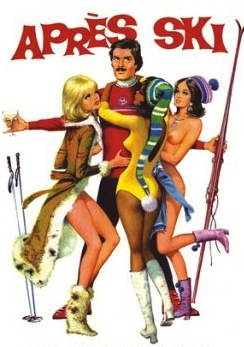Monday, September 9, 1974.
SEX ON SKIS (original French title: Après-ski). Co-written by Pierre Brousseau. Music by Marc Hamilton. Co-written and directed by Roger Cardinal. Running time: 86 minutes (original running time: 104 minutes). Restricted entertainment with the B.C. Classifier's warning: some nudity, completely concerned with sex.
"ON SKIS?" SAID A young woman in the theatre ticket line, her eyes widening. "That is awkward!"
No, it's advertising. Sex on Skis is a badly distorted translation of Après-ski, and the title of the French-Canadian movie's English-dubbed version. Made in late 1969, the film is the product of Quebec's controversial sortie into international sexploitation, one of the movies that's made Montreal a real moviemaking centre.
Skin flicks are an effective training ground for both technicians and performers, a place where they can earn as well as learn. And Quebec's exploiters have done well on the world market because their features generally look good and reflect a rare joie de vivre, an attitude about sex that is straightforward and healthy.
On the technical side, Sex on Skis is no exception. Roger Racine's cinematography is sharp and often imaginative. The same cannot be said for debuting fictional-feature director Roger Cardinal.
A former television and industrial filmmaker, Cardinal brings little sense of narrative to this tale of Phillip (Daniel Pilon), a handsome young ski instructor at a winter resort overrun with willing women. It's really too bad, because he is working with a cast capable of far better.
Statuesque Céline Lomez is one example. She gave a delightful performance as the athletic, sexually aggressive daughter in the 1971 Quebec comedy released here as Loving and Laughing. Here, she plays a vacationing film starlet, a role that contains only the most rudimentary glimpse of a character.
Her male costar faces the same problem. One of Quebec's best-known actors — along with his brother Donald, who was featured opposite Christopher Plummer in 1973's The Pyx — Daniel Pilon is capable of expressing complex dramatic feelings.
That said, no actor can open a conversation effectively with a line like "take off your pants." Nor is the effect enhanced by the film's inept dubbing. A big share of the blame must go to the screenplay's translator, who has Phillip's skiing students referring to him as "professor."
To be fair, it's not all director Cardinal's fault. His original 104-minute film is playing here in a version that is about 20 minutes shorter. Censorship in various jurisdictions around the world has left us with a disjointed, disappointing film.
The above is a restored version of a Province review by Michael Walsh originally published in 1974. For additional information on this archived material, please visit my FAQ.
Afterword: Prior to its arrival in B.C., Sex on Skis had been released in Ontario as Winter Games, in the U.K. as Sex in the Snow and in the U.S. as Snowballin'. At the time, I referred to it as a "sexploitation" film, borrowing a word coined by the entertainment trade paper Variety to describe a movie produced to exploit audience interest in sex and female nudity. The original Après-ski was one of about a dozen pictures that followed director Denis Heroux's taboo-flouting 1969 feature Valérie, a sexploitation subgenre that Variety almost immediately labelled "maple syrup porn." Director Roger Cardinal's movie benefitted from the publicity that followed a police seizure (the result of a complaint from a Catholic priest in the Quebec suburb of Saint-Roch), and was distributed internationally in market-specific versions. Though English Canadian and U.K. prints were severely cut, it's been reported that the U.S. version included hardcore scenes added by the stateside distributor from its own stock footage collection.
In the above review, I criticized Cardinal for lacking narrative skill. Today, though, I suspect that the version I saw in 1974 may have been trimmed by its distributor to eliminate story, so as to deliver a shorter, sexier film to the intended audience. Cardinal's later career was an eclectic one and includes a Genie Award director nomination for his 1988 biographical thriller Malarek, the story of a Montreal investigative reporter. The capable Daniel Pilon has enjoyed a successful career in Quebec films and television, as has his Après-ski co-star Céline Lomez. Overall, Quebec went on to build a mature, vibrant national cinema that English Canada can only envy.
If there's a villain in this piece, it's the federal government's cockeyed notion of what constitutes a national film policy. In 1967, it created an agency "to foster and promote" a feature film industry, opening offices in Montreal and Toronto. Then known as the Canadian Film Development Corporation (and now called Telefilm Canada), its focus has been on little more than production, ignoring both the cultural and business realties of filmmaking in this country. By not making a continuing priority of properly dubbing and distributing French Canada's many fine features outside of Quebec, it lost an opportunity for genuine nation building. In the process, it actually deepened the gulf between the "two solitudes." English Canada is the poorer for not having had access to a popular culture that was and is genuinely Canadian.
